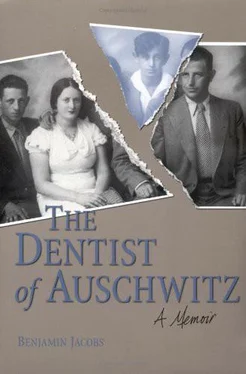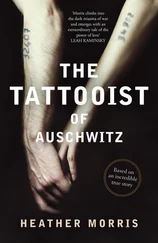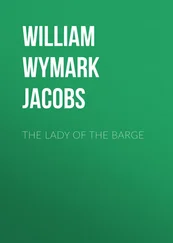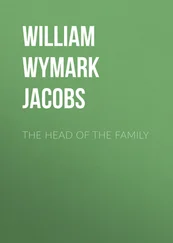I had to change my plans. I drove back on the same road that we had arrived on. Once more we were in the majestic Alps. I began to worry about the boys’ future. They needed a home and an education, neither of which I could offer them. When I first talked to them about it, they didn’t want to listen, for they preferred the gypsy life. Traveling with me was all they wanted. In Munich I heard about a Jewish American organization called HIAS, for Hebrew Immigration Aid Society, whose offices were in Frankfurt-am-Main. On the road to Frankfurt, when we stopped, I tried to reason with them. They left me and walked off into the forest. When I found them, Yaakow confessed that they were praying that I would change my mind.
In Frankfurt the survivors had a new name, DPs (displaced persons), and were housed in the Olympia Hotel in a part of town close to the main railroad station. Allied bombs had severely damaged the Olympia, and only the two lower levels could be used. The staircase was rubble. We found room in a corner on the second floor and settled there. The next day, Isidor Cohen, a New York rabbi and U.S. Army chaplain came to the hotel.
Rabbi Cohen was stout with gray hair. He was a warm and compassionate man. He saw the boys, and he asked me to bring them to him at the airport. When we came to his office the next day, another captain, also a chaplain, was with him. They spoke a strange-sounding American Yiddish, sprinkled with English words that I did not understand. We were joined by a middle-aged woman wearing a green army uniform with a patch on one sleeve that said “UNRRA.” The three discussed the fate of the boys. Then the woman turned to me and said firmly, “Leave the boys. They will go to the States as soon as we can arrange visas for them.”
Though I realized that this course of action was in the boys’ best interests, it was difficult for me to think of losing them. I had gotten so used to them that we had grown into a family. Akiva and Yaakow looked at me as if to accuse me of abandoning them. The rabbi read how the boys’ feelings translated in my mind. “You don’t have to worry. They will be well cared for here,” he said. I asked the rabbi if I could also come. He said no. At my age I had to be sponsored and was advised to register with UNRRA, the United Nations Relief and Rehabilitation Administration. Knowing that I had a car, in fact the only one at the Olympia Hotel, the rabbi proposed that I come to the army kitchen every day to pick up food for the DPs in the hotel. My Adler convertible soon carried a barrel of food to the hotel every day, and I could visit with my two boys. One day, however, I was told that they had been sent to America. That was the last I saw of Akiva and Yaakow.
More DPs arrived at the hotel, and it was soon nicknamed the Refugee Hotel. The Olympia was in fact the central meeting place for refugees arriving in Frankfurt. Many names were scribbled on the walls as people sought friends and relatives. Some succeeded in finding one another. Slowly people from partisan groups began to emerge from their hiding places. The girls began to dress in neater clothes, and the boys began to woo them. Some even learned how to smile, to frolic, and to be light again, and soon some married. Committees formed, and leaders emerged. More survivors began to arrive from the east, and the Olympia was bulging with people. We cleared the rubble from two additional floors, cleaned the rooms, and still did not have enough room. People were sleeping in the corridors and stairways. And yet more were comming.
On one day Rabbi Cohen, accompanied by a high-ranking American army officer, announced that we had to vacate the Olympia. The hotel would be renovated for American army personnel, and we would be moved forty kilometers from Frankfurt, to Salzheim. We had not heard of Salzheim before. When a few of us went there to see it, we found a camp with identical little huts neatly set in lines, which reminded me of concentration camp barracks. When we returned to the Olympia, I picked up my few things and left.
It was a nice summer afternoon. I was driving along the Mainzerlandstraße, having made no decision what to do, when two girls stopped me and asked if I would take them to their hotel. I agreed. They were both Russian, about my age, and very pretty. Since they had been working in German households, they spoke German well. When they heard that I had no place to stay, they offered me a sofa in their hotel room. I accepted an overnight invitation, but my stay turned into more than just a brief visit with them. I buried my loneliness in romance. One day two Soviet secret policemen came to force them to return home to Russia. That was the beginning of a general repatriation of all Russians from Germany. I decided then to go back to Lüdenscheid.
Srulek Lipschitz, helped by an electrical appliance manufacturer, had opened an electrical retail store. My brother also had a business selling beauty aids, perfumes, and cosmetics. The Westphalia Dental Association and the German Medical Association granted me temporary permission to practice dentistry in Germany, and I began to practice in Menden, Westphalia, in a Polish DP camp. When the camp closed, I founded the Westfälische Zahnwaren Grosshandlung, a dental supply house that thrived even after I left Germany.
Finding Zosia was my constant thought. Short of going back to Poznan, I did everything to find her, but it was all in vain. Her last known whereabouts, I learned, was somewhere in Germany, where she worked as a forced laborer, a Zwangsarbeiter. She had not return to Poznan.
One day I heard the name Harry Spitz mentioned on Nordwestdeutscher Rundfunk, the first German radio station broadcasting in Hamburg after the war. When I called him, he invited me to come to see him in Hamburg. The station offices, on the Oberstraße, were in good condition for that street. On the building’s facade was a menorah. Inside, a Star of David over the staircase. Unusual, I thought, for a German radio station.
I gave the receptionist my name and told her whom I had come to see. “Do you have an appointment with the music director?” she asked. I said no but requested that she give Herr Spitz my name. “Herr Spitz, a man by the name of Bronek Jakubowicz is here to see you.”
Harry came dashing down the stairs and fell into my arms. Over and over again he kept repeating, “This young man saved my life in Auschwitz.” Then he took me through the building. It had been built at the beginning of the eighteenth century and indeed had been a synagogue. It had several large studios, one the size of an amphitheater. It survived all the Allies’ heavy bombing. We spent twenty-four hours together reminiscing.
Germany was a puzzle. In a sense the Germans were less anti-Semitic than the rest of the Europeans. Where did Hitler find the criminals to perpetrate those insane crimes on the Jews?
For the Germans life was slowly returning to normal. But we were too traumatized to live peacefully among them. In Germany we had to walk the same streets, eat the same food, and breathe the same air as they did. The sinners were suddenly saints, the guilty just bystanders. For reasons not hard to understand, even the best-known Nazis denied their complicity in the Holocaust. We had to be careful what we said and whom to trust. This posed an unexplainable question. Yet we had to maintain civility and often had to bite our tongues to avoid saying how we really felt. For me the four years I lived in Germany after the war offered many lessons, about both the good and the bad in humankind. In those four years I was in and out of German hospitals seeking help for the ulcer pains that still plagued me.
The news from Poland was even grimmer. There anti-Semitism was still rampant. The spirit of Hitler’s teaching was alive and well. That he choose Poland as our grave was not a coincidence. The Polish Jews were the Nazis’ chief target. Many Jews who dared to return to their possessions were killed by those who seized their property when the Germans left. Though my brother and I were also heirs to property in Poland, we wanted none of it.
Читать дальше












